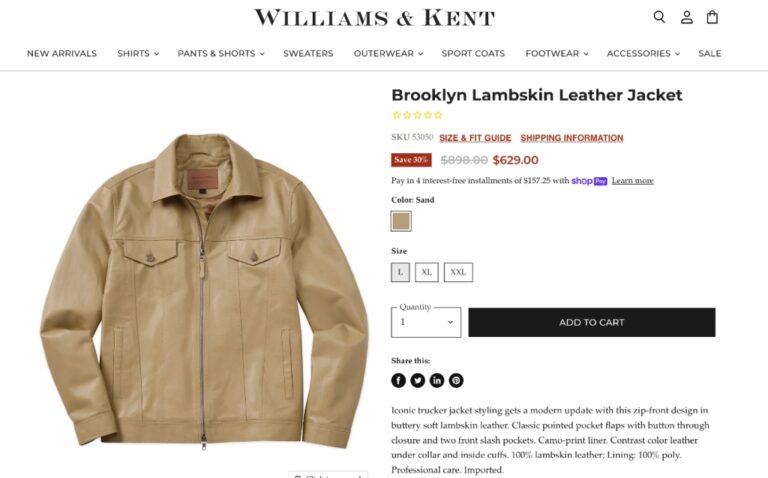
Retail decision making not only requires a treasure trove of data, but it first needs executives to pinpoint the right questions that need to be asked, such as “What products should I cut?” “What products are my most frequent shoppers buying?” “Which customers are at risk of never returning?” and “How many Williams & Kent lambskin leather jackets were sold yesterday?”
These are the questions that Phoenix Direct looks to solve for its apparel clients by leveraging AI-powered analytics platform AnswerRocket, a technology that offers data science techniques and analyses to solve business problems and recommend ideal decisions from the data on hand.
Phoenix Direct is a service that operates as a B2B marketing agency and a third-party logistics (3PL) provider mixed together, offering apparel brands back-end assistance for receiving, fulfilling and reporting inventory, yet also building out the front end in creating and maintaining e-commerce sites, email marketing and mail order catalogs.
Headquartered in Duluth, Ga., the jack of all trades operates in a facility that includes a warehouse, a photography studio and offices for creative, e-commerce and a customer call center.
According to Jay Allen, senior vice president of marketing at Phoenix Direct, the firm helps manufacturers and retailers go direct to consumer without having to hire staff, build a warehouse or create their own shipping networks.
The agency side examines brands’ data across merchandising, customer and e-commerce optimization to determine decision making and create new marketing initiatives, but the company has accelerated this process with AnswerRocket.
AnswerRocket operates like an in-house Google search for enterprise data, as the platform can integrate with company data sources like Google Analytics, Salesforce, Oracle, SAP and more. The software’s natural language processing capabilities are built to understand the phrases a user types into a search bar. From there, the platform can run an analysis on a question, connect the dots and dynamically compose narratives. These explain the analysis and display key insights in visualizations the users can understand, whether it be graphs or a news feed.
“I can see how [and why] my conversion rate was up or down yesterday,” Allen said. “What are the three things that impacted that and what drove it? E-commerce is so data-dependent, and it’s really important to understand this wave of data coming at you. And what I really like about AnswerRocket is they’re not just giving you the data back in some kind of a basic dashboard, they’re actually helping you interpret the data, what it means and why, and how you make decisions based on it. It feels like the next level of analytics.”
Allen also highlighted the platform’s cohort analysis, which has enabled Phoenix Direct to better understand customer lifetime value (CLV), how it changes over time and how it changes based on where they acquire the customer. The surprises found from that data have enabled the agency to shift strategies for some of its client businesses, leaving Allen optimistic that the company will further improve future sales.
“They’re bringing these high-end analyses down and making them usable for a smaller company,” Allen said. “There’s a lot of insight in that data that can help us really guide our companies in terms of where they invested, and why they’re putting money in certain areas. A lot of what we learned is very specific to the individual companies. And then on our side, they really allowed us to speed up our insights and make decisions faster, and essentially get information back to these companies faster than we could before.”
Phoenix Direct works largely within the men’s apparel space with companies like Williams & Kent, Patrick James, Bobby Jones, Westport Big & Tall and Link Soul among others, but is working with more women’s apparel sellers as it has grown.
But the banners and their customers are all have different qualities. For example, the customers acquired by luxury men’s fashion brand Williams & Kent during the holiday are far more valuable than customers acquired throughout the year.
“That tells you we should be willing to spend more to acquire a customer during those times,” said Allen. “That was one example that was different than the rest of the data showing for other customers.”
AnswerRocket has been beneficial to Phoenix Direct’s hybrid model as well, in that it can help the company’s manufacturers grow their DTC businesses without the pain points associated with expanding that channel. The 3PL’s 82,706-square-foot warehouse space accommodates more than 400,000 SKUs from 200+ vendor sources, and now works with clients ranging from 20 orders per month to 9,000 per month.
“Shipping 100 SKUs to a store is really different than shipping 100 SKUs to 100 different customers,” Allen said. “For the B2B, 3PL model, you have to really optimize for small shipments to many people versus big shipments to a few people. I think we’ll continue to lean in our apparel heritage to make it work for them. There’s just still a lot of apparel manufacturers that could and probably should go direct.”
Allen expects the partnership between Phoenix Direct and AnswerRocket to further develop by integrating more information sources that the analytics technology can leverage to provide definitive business recommendations. This includes Phoenix Direct’s current stack of tech integrations, including Shopify, e-commerce fulfillment provider ShipHero and marketing automation platform Klaviyo.